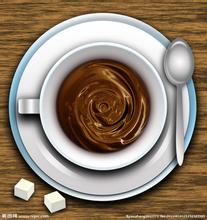The effect of caffeine inhaled energy bar on fancy coffee
Caffeine
The caffeine content in coffee varies greatly.

Researchers found that a 16-ounce cup of Starbucks coffee contains 100mg more caffeine than the same size Dunkin' Donuts coffee, according to a study published in the journal Toxicology Analysis. The study also shows that even the same coffee drink from the same chain may have a difference of 300 milligrams in caffeine levels after buying it every day. Experts say the standard amount of caffeine in a cup of coffee usually ranges from 90 to 225 milligrams.
Eight things people won't tell you about caffeine.
The caffeine content in espresso is actually not high.
Everyone thinks espresso has the highest caffeine content, but experts say a cup of espresso contains about 40-70 milligrams, much less than a medium cup of American coffee. If dripping coffee is too strong for you, then a cup of fancy coffee such as a cappuccino may be a wiser choice.
Eight things people won't tell you about caffeine.
Caffeine doesn't dehydrate you.
About 98% of caffeine is consumed through drinks, which means you replenish your water as well as caffeine. So although caffeine is a diuretic, it can't really dehydrate you. However, this does not mean that you can unscrupulously choose coffee drinks, or enough is enough, don't forget, only pure white water can really replenish water.
Eight things people won't tell you about caffeine.
The source of caffeine is not limited to drinks.
Chocolate is also a major source, tea also contains caffeine, and caffeine can be added to almost any food or substance, which is why you will find caffeine in some drugs. If you have heart disease or high blood pressure, contact your doctor before taking any caffeine-containing painkillers.
The average person's daily caffeine intake is 300 mg to avoid excessive addictive caffeine intake can cause palpitations, diarrhea and other phenomena, so for people with constipation problems, occasionally drinking a cup of black coffee can also help defecation. Because coffee is diuretic, people who drink coffee as water may have to be careful to be dehydrated, beware of insufficient water content, and if they drink too much coffee for a long time, they will easily have caffeine withdrawal; therefore, dietitian Li Wanping suggests that normal people consume about 300 milligrams of caffeine a day, about the amount of a cup of black coffee sold in the market. Chronic patients need to drink coffee, dietitian Li Wanping mentioned that patients with chronic diseases should drink the right coffee. If fancy coffee is made, it may add too much sugar and cream, which will affect the change of blood sugar and poor metabolism of uric acid. People with arrhythmia and gastric ulcers should avoid drinking black coffee as far as possible. If people with insomnia drink coffee in order to refresh themselves in the morning, the problem of insomnia will be even more serious.
Worried about osteoporosis can mix milk with coffee dietitian Li Wanping pointed out that drinking coffee will cause a temporary loss of calcium in the urine, if their own calcium intake is insufficient, it is likely to affect bone density. Taiwanese people generally have a daily calcium intake of 500mg to 600mg. It is recommended that people should eat 1000 mg of calcium a day. For a gap of 400mg, you can drink 400cc milk to make up for people who are worried about osteoporosis. You can mix milk and coffee.
Important Notice :
前街咖啡 FrontStreet Coffee has moved to new addredd:
FrontStreet Coffee Address: 315,Donghua East Road,GuangZhou
Tel:020 38364473
- Prev

Coffee flavor curve record which kind of coffee roaster is better than the flavor wheel
The coffee flavor curve is introduced in detail. Beans will lower the temperature in the stove when they go down. This is the ditch at the beginning. two。 From then on, it began to heat up. But at first, the temperature should not be too high, nor should it be too low. It can't cool down. The beans should be dried first. After drying, it will be heated evenly to make the beans crisp. Although some high-tech roasters allow you to try baking with two peaks high and low.
- Next

Introduction to the treatment method of Grinding degree in producing areas of three key words of hand-made Coffee
Step 1: fold the filter paper and put it into the filter cup. Hot water rinse filter paper step 2: rinse filter paper with hot water, as long as let filter paper all wet, so as to remove the smell of filter paper. (although there is only a little water to wash the filter paper, don't forget to pour it out first and then carry out the follow-up action.) Coffee powder rub a small hole step 3: pour in the coffee powder, let the powder distribute evenly, and in the middle
Related
- Beginners will see the "Coffee pull flower" guide!
- What is the difference between ice blog purified milk and ordinary milk coffee?
- Why is the Philippines the largest producer of crops in Liberia?
- For coffee extraction, should the fine powder be retained?
- How does extracted espresso fill pressed powder? How much strength does it take to press the powder?
- How to make jasmine cold extract coffee? Is the jasmine + latte good?
- Will this little toy really make the coffee taste better? How does Lily Drip affect coffee extraction?
- Will the action of slapping the filter cup also affect coffee extraction?
- What's the difference between powder-to-water ratio and powder-to-liquid ratio?
- What is the Ethiopian local species? What does it have to do with Heirloom native species?

